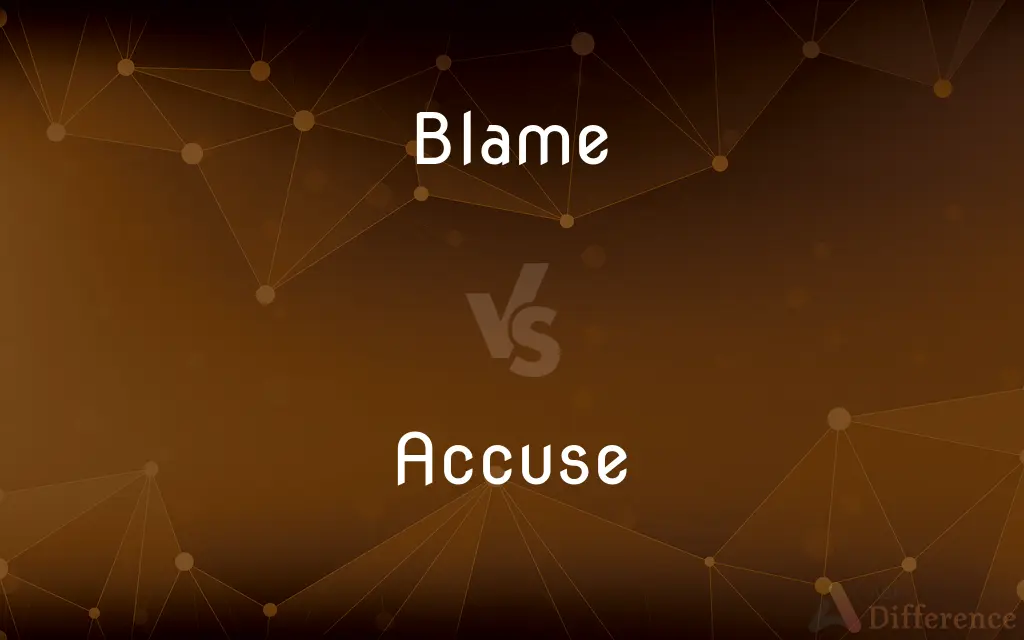Blame vs. Accuse — What's the Difference?
Edited by Tayyaba Rehman — By Fiza Rafique — Updated on October 25, 2023
Blame assigns responsibility for a fault or wrong, while Accuse alleges someone has committed an offense.

Difference Between Blame and Accuse
Table of Contents
ADVERTISEMENT
Key Differences
Blame and Accuse are terms that denote responsibility and allegation, respectively. To Blame someone means to believe or state that they are responsible for a particular fault or wrong. For instance, if someone spills a drink, they might be blamed for the mess. On the other hand, to Accuse someone is to claim that they have committed a specific offense or crime, often requiring formal proof or evidence.
While both Blame and Accuse involve assigning responsibility, their contexts can be different. Blame is often used in casual or everyday situations, like blaming a friend for being late. Accuse, however, is a stronger term and is commonly used in legal or serious contexts, such as accusing someone of theft.
The act of Blaming can be subjective and based on personal beliefs or feelings. One might blame the rain for ruining an outdoor event, even if it's a natural occurrence. Accusing requires more objectivity, often needing evidence or witnesses to substantiate the claim. For example, in court, an accusation demands proof.
In essence, while both Blame and Accuse imply responsibility, Blame leans towards assigning fault, often without the need for formal evidence. Accuse, conversely, suggests a more serious allegation that asserts someone has committed an act warranting investigation or punishment.
Comparison Chart
Definition
Assigning responsibility for a fault or wrong.
Alleging someone has committed an offense.
ADVERTISEMENT
Context
Often casual or everyday situations.
Generally serious or legal contexts.
Requirement
Can be subjective and based on personal beliefs.
Often needs evidence or witnesses.
Grammatical Role
Noun, Verb
Verb
Example Usage
"They blame the weather for the delay."
"He was accused of breaking the window."
Compare with Definitions
Blame
To assign responsibility for a mistake or fault.
Many blame the system for the error.
Accuse
To point out a fault or wrongdoing.
He was accused of negligence in his duties.
Blame
The responsibility for a fault or wrong.
The blame lies with the management.
Accuse
To bring charges against someone.
The prosecutor accused the suspect of fraud.
Blame
Blame is the act of censuring, holding responsible, making negative statements about an individual or group that their action or actions are socially or morally irresponsible, the opposite of praise. When someone is morally responsible for doing something wrong, their action is blameworthy.
Accuse
To allege a wrongdoing.
Witnesses accused the driver of speeding.
Blame
To consider responsible for a misdeed, failure, or undesirable outcome
Blamed the coach for the loss.
Blamed alcohol for his bad behavior.
Accuse
Charge (someone) with an offence or crime
He was accused of murdering his wife's lover
Blame
To find fault with; criticize
I can't blame you for wanting your fair share.
Accuse
To charge with a shortcoming or error.
Blame
To place responsibility for (something)
Blamed the crisis on poor planning.
Accuse
To charge formally with a wrongdoing.
Blame
The state of being responsible for a fault or error; culpability.
Accuse
To make a charge of wrongdoing against another.
Blame
Censure; condemnation
"Hoover hazarded more in the way of federal response to economic crisis than any president before him, but his efforts were not enough to divert the blame and wrath of the American people" (Michael B. Stoff).
Accuse
(transitive) to find fault with, blame, censure
Blame
Censure.
Blame came from all directions.
Accuse
To charge with having committed a crime or offence
For the U.S. President to be impeached, he must be accused of a high crime or misdemeanor.
Blame
Culpability for something negative or undesirable.
The blame for starting the fire lies with the arsonist.
Accuse
(intransitive) to make an accusation against someone
Blame
Responsibility for something meriting censure.
They accepted the blame, but it was an accident.
Accuse
(obsolete) Accusation.
Blame
(computing) A source control feature that can show which user was responsible for a particular portion of the source code.
Accuse
Accusation.
Blame
To censure (someone or something); to criticize.
Accuse
To charge with, or declare to have committed, a crime or offense
Neither can they prove the things whereof they now accuse me.
We are accused of having persuaded Austria and Sardinia to lay down their arms.
Blame
(obsolete) To bring into disrepute.
Accuse
To charge with a fault; to blame; to censure.
Their thoughts the meanwhile accusing or else excusing one another.
Blame
To assert or consider that someone is the cause of something negative; to place blame, to attribute responsibility (for something negative or for doing something negative).
The student driver was blamed for the accident.
Accuse
To betray; to show.
Blame
To assert the cause of some bad event.
We blamed the accident on the student driver.
Accuse
Bring an accusation against; level a charge against;
He charged the man with spousal abuse
Blame
To censure; to express disapprobation of; to find fault with; to reproach.
We have none to blame but ourselves.
Accuse
Blame for, make a claim of wrongdoing or misbehavior against;
He charged me director with indifference
Blame
To bring reproach upon; to blemish.
She . . . blamed her noble blood.
You were to blame, I must be plain with you.
Accuse
To claim that someone has done something wrong or illegal.
She accused him of stealing her purse.
Blame
An expression of disapprobation fir something deemed to be wrong; imputation of fault; censure.
Let me bear the blame forever.
Accuse
To blame or charge with an offense.
She accused her coworker of spreading rumors.
Blame
That which is deserving of censure or disapprobation; culpability; fault; crime; sin.
Holy and without blame before him in love.
Blame
Hurt; injury.
Blame
An accusation that you are responsible for some lapse or misdeed;
His incrimination was based on my testimony
The police laid the blame on on the driver
Blame
A reproach for some lapse or misdeed;
He took the blame for it
It was a bum rap
Blame
Put or pin the blame on
Blame
Harass with constant criticism;
Don't always pick on your little brother
Blame
Attribute responsibility to;
We blamed the accident on her
The tragedy was charged to her inexperience
Blame
Expletives used informally as intensifiers;
He's a blasted idiot
It's a blamed shame
A blame cold winter
Not a blessed dime
I'll be damned (or blessed or darned or goddamned) if I'll do any such thing
He's a damn (or goddam or goddamned) fool
A deuced idiot
Tired or his everlasting whimpering
An infernal nuisance
Blame
To hold responsible for something undesirable.
She blames her cold on the chilly weather.
Blame
To criticize or condemn.
Critics blame the director for the movie's failure.
Blame
An act of attributing fault.
He took the blame for the oversight.
Common Curiosities
Is Accuse a stronger term than Blame?
Yes, Accuse often implies a more serious allegation, especially in legal contexts.
Can Blame be both a noun and a verb?
Yes, one can "place the blame" (noun) or "blame someone" (verb).
What's the primary context for using Blame?
Blame is often used in everyday or casual contexts to assign fault.
Are accusations always formal?
No, accusations can be made casually, but they're often associated with formal allegations.
Can Accuse be used in non-legal contexts?
Yes, one can accuse someone in casual contexts without legal implications.
Can you Blame natural occurrences?
Yes, one might blame the rain for a ruined event, even though it's a natural event.
Is Blame always negative?
Generally, Blame has a negative connotation, but context matters.
Is it common to blame oneself?
Yes, individuals often blame themselves for outcomes, whether justified or not.
Do all accusations require evidence?
In formal settings like court, accusations typically require evidence, but in casual contexts, they might not.
Can Blame be shared?
Yes, blame can be shared among multiple parties for a situation.
How does society often react to Blame?
Blame can lead to feelings of guilt or responsibility in the blamed individual.
Is an accusation always true?
No, an accusation is an allegation, which needs verification or proof.
What happens after someone is accused in a legal sense?
After an accusation, an investigation or legal proceeding often follows.
Do Blame and Accuse always imply truth?
No, both terms imply belief or allegation, but the truth requires verification.
Can an accusation be withdrawn?
Yes, especially if it's found to be false or if there's a lack of evidence.
Share Your Discovery

Previous Comparison
Role vs. Function
Next Comparison
Consistency vs. ContinuityAuthor Spotlight
Written by
Fiza RafiqueFiza Rafique is a skilled content writer at AskDifference.com, where she meticulously refines and enhances written pieces. Drawing from her vast editorial expertise, Fiza ensures clarity, accuracy, and precision in every article. Passionate about language, she continually seeks to elevate the quality of content for readers worldwide.
Edited by
Tayyaba RehmanTayyaba Rehman is a distinguished writer, currently serving as a primary contributor to askdifference.com. As a researcher in semantics and etymology, Tayyaba's passion for the complexity of languages and their distinctions has found a perfect home on the platform. Tayyaba delves into the intricacies of language, distinguishing between commonly confused words and phrases, thereby providing clarity for readers worldwide.
















































